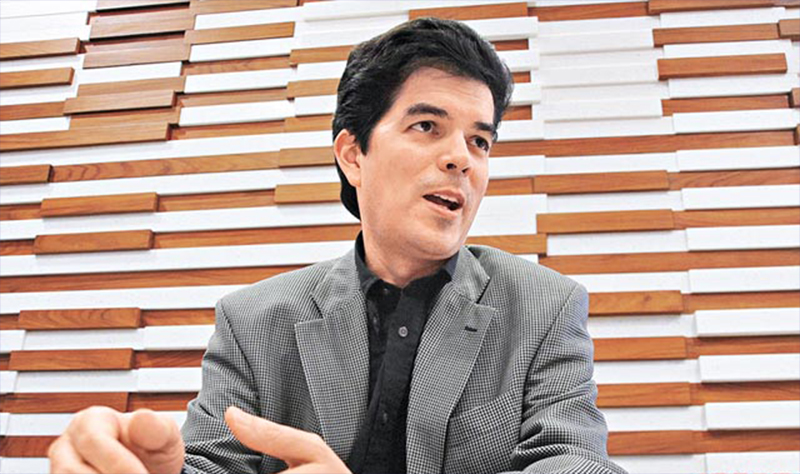An independent statutory body has ruled that hyperlinks to court judgments must be removed from an activist’s website, because they disclosed the identity of a person whose name was redacted in the judgments. Activist David Webb complained that the decision established a “right to be forgotten” without any proper legislation, which will make public data private.
One female member of several statutory panels was involved in divorce proceedings between 2000 and 2002. She wrote to the Chief Judge of the High Court in 2010 requesting removal of three judgments from the Legal Reference System of the Judiciary’s website. The judgments were then edited so that the names of the parties and their children would be redacted.
However, if a user entered the person’s name using the “Who’s Who” function of Webb-site.com, the website of activist and share market analyst David Webb, three hyperlinks would be showed linking to the three anonymised judgments, thus revealing her identity.

Weighing press freedom against privacy
The person lodged a complaint with the Office of the Privacy Commissioner for Personal Data (PCPD) against Webb in 2013. The complaint was accepted by the PCPD, who decided that Webb had contravened Data Protection Principle 3 of the Personal Data (Privacy) Ordinance (DPP 3).
The DPP 3 states that personal data shall not, without the prescribed consent of the data subject, be used for any purpose other than the purpose for which the data was originally collected.
Acting Privacy Commissioner Fanny Wong said: “In weighing the freedom of press and expression against the personal data privacy of the complainant, the PCPD was of the view that the disclosure of the complainant’s identity … did not serve to promote the transparency of operations of companies, governments, regulators and controlling shareholders; nor was it able to achieve the purpose of condemning public vices or protecting the minority shareholders’ interest.”
“In the circumstances, the balance should be tipped in favour of protecting the Complainant’s personal data in the three anonymized judgments.” An order was then served upon Webb directing him to remove the three hyperlinks.

Chilling effect on press freedom
Webb subsequently lodged an appeal against PCPD’s decision to the Administrative Appeals Board (AAB) – an independent statutory body which hears and determines appeals against administrative decision – and it was dismissed by the AAB on October 27.
The AAB took the view that the balance between freedom of expression and personal data privacy protection struck by the PCPD was reasonable. It also rejected Webb’s argument that the common law principle of open justice would exempt him from any breach of DPP 3.
Webb wrote on his website after the ruling that “The decision, while it stands, will have a chilling effect on the freedom of the media in Hong Kong… This will deter media coverage of writs and judgments, or at least will mean that media will have to run take-down departments to deal with requests for removal of embarrassing public domain information, and if they cannot afford that then they will remove their archives from public view.”
“The media can now expect an avalanche of requests and complaints to the PCPD from people who consider that online embarrassing information on their past convictions, bankruptcy, or personal litigation are personal data that the media should not have reported,” he wrote.

Lack of constitutional necessity
Webb said this decision established a “right to be forgotten” – as in a ruling by the European Court of Justice that users can ask websites to remove personal information – and removes a “right to remember and repeat” without any proper legislation. He added that “the Personal Data Privacy Ordinance was intended to keep private data private, not to make public data private.”
He said the decision neglected the issue of whether the implied restriction on freedom of speech and expression contained in the Article 27 of the Basic Law and Article 16(2) of the Bill of Rights was constitutional. A restriction on a constitutional freedom must be “necessary” to protect another right, and this means that the restriction must substantially achieve its goal while doing no more harm to freedom than is necessary.
He added that Hong Kong’s public domain information is freely available on the internet and can be collected from overseas and published overseas: “Therefore the restriction cannot achieve its objective, harms Hong Kong-based publishers and is void for lack of constitutional necessity.”
The AAB had ignored the fact that no such restriction could be enforced against publishers outside local jurisdiction, particularly if the publisher is in a country where the activity is legal, as in Singapore, where there is an exemption for publicly available data, or the USA, where they have constitutional freedom of speech, he said.
Webb says he will consider a further appeal, but this will cost time and effort which might be better spent elsewhere. A better solution would be a legislative amendment explicitly exempting legally-published public domain data from the Personal Data (Privacy) Ordinance, as in Singapore.
